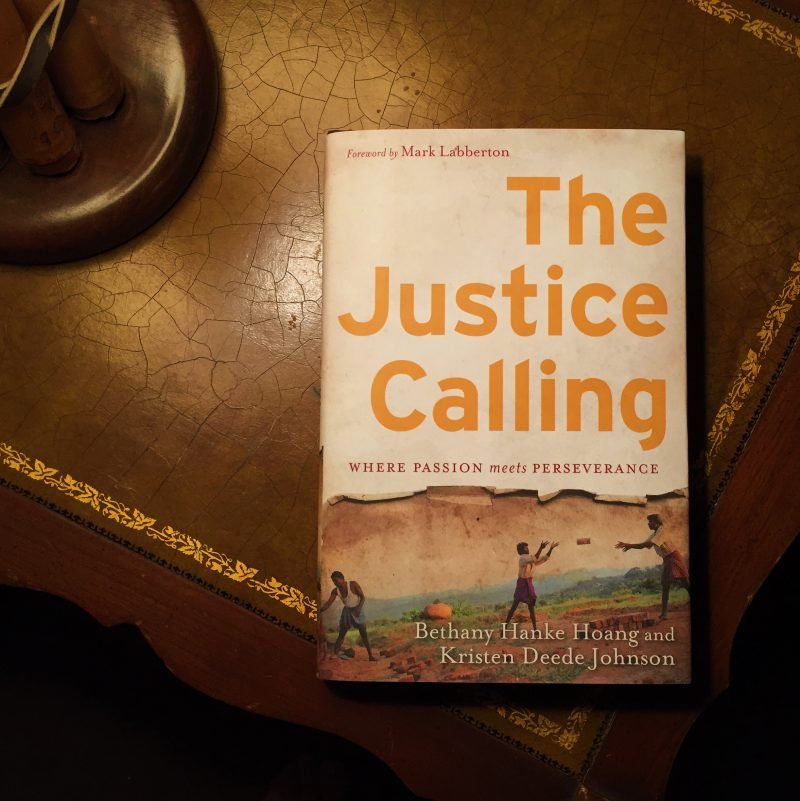The Justice Calling
A few years ago, I wrote a thing for RELEVANT that appeared under the title (not chosen by me) “Serving Justice vs. Saving Souls.” Part of what I was trying to do in that piece was “to bridge the artificial divide between evangelism and social action,” drawing on the work of thinkers like René Padilla and Samuel Escobar.
The other motivation behind the article was to remind that magazine’s readers – a certain segment of people my age and slightly younger, generally speaking – that (1) we are not the first generation of Christians to care about justice and (2) if our concern for justice is to endure as an integral part of our lives, we’re going to need some theological and historical resources.
I wrote that back in 2012, and it is my hope that the essay served its purpose at the time. These days, though, I’d just encourage people to read The Justice Calling: Where Passion Meets Perseverance by Bethany Hanke Hoang and Kristen Deede Johnson.
The authors situate the pursuit of justice, as they should, in the story of the Bible – the story of what God is doing about this broken but beautiful world he loves. Along the way, they cover a lot of important ground, demonstrating that justice and righteousness must never be detached from each other and that God’s vision for his creation is flourishing in every direction. The book ends with a wonderful meditation on hope, something that’s desperately needed to sustain us not just in the work of justice, but throughout our lives.
For me, the most moving chapter of the book was the one on lament, which they frame this way: “To lament is to wait upon the Lord for him to act, but it is a waiting that moves – a waiting that is also a seeking, a longing, a pursuit.”
To demonstrate what this kind of God-honoring lament looks like, Hoang and Johnson point us to the prophet Habakkuk, and especially to the first chapter of his book. Having come face-to-face with tremendous injustice, his faith is rattled to the core. “But even as he contends with God and protests God and even accuses God of not being who God says he is,” they write, “Habakkuk never stops talking with God or seeking to hear God. Habakkuk never walks away. In his anger and anguish and confusion and tears, Habakkuk keeps moving toward God.” They continue:
Habakkuk asks deep, haunting questions that are not answered in the space of his lifetime. We too have deep, unanswered questions for God and one another. Some questions will become clear in our lifetime, and others will not. But whether we experience God’s answers in the ways we long to experience them does not change who God is, and neither does it change the unshakable reality that God is good and that his love for us endures forever.
In the pursuit of justice, as in other areas of life, we will inevitably experience the pain of suffering and hardship. Our efforts will go to waste. Prayers will be met with silence. We will grow tired. We will grow angry. We will seek diversions.
What matters then is what we do with our weariness, our dashed hopes, our sadness, our doubt. It is not at all inevitable that we will automatically follow the course of Habakkuk, even if we know in our heads that the work of justice is a God-given calling. Like Habakkuk, however, we’re invited to keep on asking those difficult questions. And God invites us to keep moving toward him, rather than away, even when all hell breaks loose, even when it seems all hope is gone.
“Why God has so determined that our prayers matter is a mystery,” Hoang and Johnson write. “The God of the universe, who called all things into being, does not need our prayers. But God has chosen to invite us into his work, and he has determined that our prayers do and will matter.”
I hope you’ll pick up a copy of The Justice Calling and that you’ll give it a careful reading. Then I’d love to know what you think.

